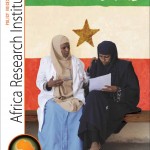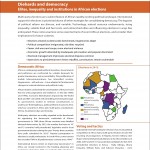The migration of health professionals from Africa in search of higher salaries, job security and career development is by no means new. The NHS has a long history of employing African health professionals. Most observers agree the so-called ‘Brain Drain’ comes at a significant loss to African health sectors, both financial and in terms of human capital. Others point to the long term benefits associated with international migration of skilled workers. A recent report by the Institute of Public Policy Research (IPPR) argues that developing countries benefit in kind from migration of skilled workers through remittances, improved trade links and as people return with new knowledge and experience.
A recent article in the Guardian newspaper argues that the UK’s ‘one-way’ migration policy discourages skilled African immigrants from returning to support the development of their native country, whether temporarily or permanently. The article, by a Nigerian doctor working in the NHS, sparked much debate in our office. While we all sympathised with his decision to leave Nigeria for the UK, one colleague found Mr Anya’s tone a little disingenuous – he said he was concerned about his country but the article focused entirely on his own needs. Another colleague suggested he wanted to ‘have his cake and eat it’ – he liked the idea of returning home but he wanted his status as a doctor to confer benefits that other immigrants would not be entitled to, namely the right to return to country and job.
Granted Mr Anya’s tone implied some selfishness, but he does raise a number of important issues which the Home Office would do well to consider. Most African health workers do not intend to move abroad permanently. There is a genuine will within the Diaspora to contribute to the development of their native country, but very few opportunities to do so. The UK’s visa framework is notoriously rigid. The Points Based System aims to select immigrants the economy needs most. If migrant workers want to return to their native country for longer than six months they risk compromising their visa or citizenship status in the UK.
In this sense, the aims of UK immigration policy are at odds with the aspirations of our £7 billion international development budget. To quote IPPR “there is almost no other area of UK policy which is so clearly international in its scope and yet where the sole objective is to maximise benefits to the UK”. A recent report by the British charity VSO argues for the UK to promote ‘circular migration’, by making provisions for a ‘pause’ in the citizenship journey for migrants workers wishing to share their skills in their native country. This is one of the key recommendations in the World Health Organisation and Commonwealth Codes of Practice on the International Recruitment of Health Personnel.
In an era of global economic integration, it is neither feasible nor morally defensible to prevent qualified African professionals to seek employment opportunities abroad. But the majority of African countries continue to suffer from chronic shortages of health workers. Of the eight Millennium Development Goals agreed in 2000 those relating to the reduction child mortality and improvement of maternal health are the least likely to be met.
In the run-up to the 2010 general election Africa Research Instituteargued that UK should dedicate a share of its aid budget – in proportion to the tax contribution of African processionals in Britain – to reduce the skills deficit in health, education and engineering. In times of fiscal austerity, a programme to encourage circular migration of skilled migrants would be a cost effective way to achieve an ambitious aid target. Skilled migrant workers should be able to take one or two year sabbaticals without having their visa status compromised.
Jonathan Bhalla
Research Manager – Africa Research Institute












